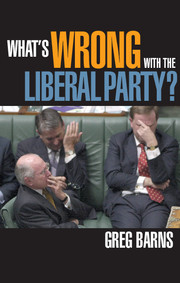Book contents
- Frontmatter
- Contents
- Dedication
- Acknowledgements
- 1 Introduction
- 2 ‘Walking Down the Middle of the Road’
- 3 A Liberal Party Obsession
- 4 Whither the Nationals?
- 5 Assuming One Nation
- 6 The Paradox
- 7 After Howard?
- 8 Meeting the Challenges: Have the Liberals Been Captured?
- 9 So Where To from Here?
- 10 Conclusion
- Endnotes
- Bibliography
- Index
- Frontmatter
- Contents
- Dedication
- Acknowledgements
- 1 Introduction
- 2 ‘Walking Down the Middle of the Road’
- 3 A Liberal Party Obsession
- 4 Whither the Nationals?
- 5 Assuming One Nation
- 6 The Paradox
- 7 After Howard?
- 8 Meeting the Challenges: Have the Liberals Been Captured?
- 9 So Where To from Here?
- 10 Conclusion
- Endnotes
- Bibliography
- Index
Summary
When John Howard is leader of the Liberal Party no more, he will leave behind him an extraordinary legacy. John Howard's imprint on the Liberal Party's philosophical and political outlook and modus operandi at the federal level can be legitimately compared with that of Menzies. At the beginning of the 21st century there is no debate, literally, about the party's future ideological bent – it is decidedly socially conservative and economically free-market, and its social liberal wing is all but mute. Its political practice continually involves the protection of its new territories and the One Nation sympathisers. John Howard has shown a preparedness to tap the fear in the Australian electorate about the continent's physical isolation and consequent mythical vulnerability. Howard ruthlessly and emphatically portrays his opponents on the left as being ‘out of touch with ordinary people’.
The extent to which Howard has captured the hearts and minds of senior members of the Canberra press gallery is evident in these two citations from Dennis Shanahan and Paul Kelly of the Australian newspaper. Shanahan, writing after Howard's fearbased 2001 election campaign, said that Howard had the opportunity to take the Liberal Party to a place that would make it a ‘greater party than that envisaged by Robert Menzies’. In John Howard, Shanahan told his readers, the Liberal Party has a leader ‘who appeals to rural voters, blue-collar workers, older Australians and those living in and around rural towns’, and what makes the Liberal Party's transcendence into a party that can represent more of Australian than ever before is that Howard is a ‘creature’ of the Liberal Party.
- Type
- Chapter
- Information
- What's Wrong with the Liberal Party? , pp. 84 - 103Publisher: Cambridge University PressPrint publication year: 2003



